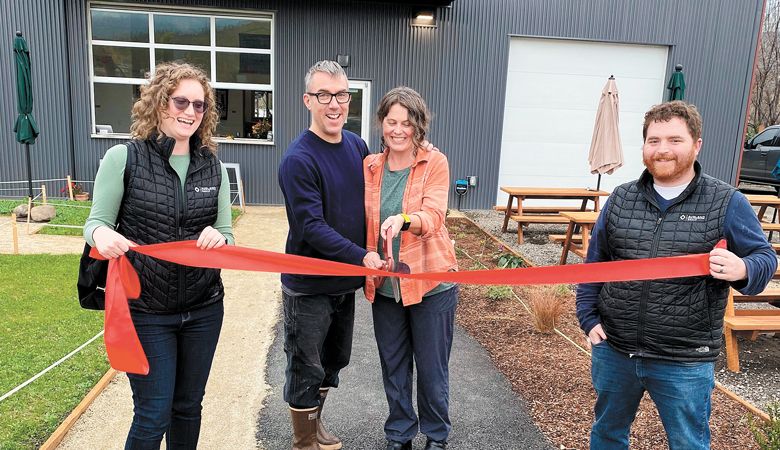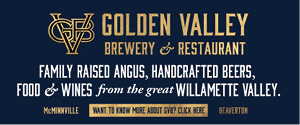Giving Way
Charity part of Oregon wine's DNA
Whether you call it Christmas, Diwali, Kwanzaa or Hanukkah, the holidays are all about giving. If only the season of charity was encouraged this fully all year long. For many winemakers, it is.
In September of 2020, a major blaze started at the north end of Ashland. Fueled by high winds, the Alameda Fire whipped down a nine-mile path destroying nearly 3,000 structures and killing three. Downwind, Simple Machine Winery in the city of Talent was totally destroyed. An inventory of 30 barrels and 20,000 bottles of wine was annihilated into piles of ash. Tools and equipment were rendered useless.
As his winery was engulfed in flames — everyone evacuated safely — Simple Machine co-owner Brian Denner recalls a cell phone call he received from Jim Bernau, CEO/President of Willamette Valley Vineyards, asking if everyone was safe and what he could do to help.
“Out of the blue, he calls,” marvels Denner. “One of the biggest wineries in Oregon helping one of the smallest,” noting that he and his wife/business partner, Clea Arthur, are Simple Machine’s entire staff.
Bernau’s call and generous donation of fruit helped the couple see a path forward, and that was just the beginning. What followed was a huge outpouring of aid from their own Rogue Valley winemaking community.
The couple’s friend, Brian Gruber of Barrel 42 in nearby Medford, led a drive to source donated fruit for Simple Machine, so they could continue to produce. “We crushed over 27 tons of fruit last year — about half donated. That’s the most ever for us under the Simple Machine label,” Denner says. “It kept us going.”
Gruber’s business partners Herb Quady of Quady North and Nicole Schulte warmly welcomed the suddenly homeless Simple Machine operation into their facility five miles away.
“They invited us at the height of harvest activity. There was really no room,” Denner says. “But they made room.” Denner then became a full-time member of Barrel 42’s harvest crew, working every day to help make Barrel 42’s wines. Later in the day, he’d work on Simple Machine’s wines. Gruber, Quady and their staff tended the Simple Machine’s fermentation at times Denner couldn’t be there.
Meanwhile, as the couple rebuilt, donations of equipment and tools came pouring in. Denner also generated a much-needed new cash flow with “futures,” an arrangement where customers pay upfront for wines to be made and delivered in the future.
The recovery effort culminated with reopening a new, 2,700-square-foot winery and tasting room built on the ash-scarred cement slab of the original structure. “That blackened floor adds character,” Arthur says. “It makes us humble and reminds us of how far we’ve been able to come thanks to so much generosity.”
Three months ago, with only generator power at first, they started making wine in their new facility. They’re now fully up and running with the recent opening of their tasting room.
The tables turned at harvest this year when Gruber’s press broke at Barrel 42. “I was very happy to help crush his grapes,” says Denner.
In a nice twist on “re-gifting,” imagine winemaker Eric Weisinger’s surprise when Denner showed up recently to personally present him with a case of Pinot Noir at Weisinger Family Winery in Ashland. The wine was made from fruit Weisinger donated to Simple Machine last year. Denner also surprised him with a vineyard designate on the label. “Ah, he didn’t have to do that,” Weisinger says, obviously touched by the gesture.
When asked about everyday “gifts” among winemakers, Weisinger spoke of his own interactions with fellow area winemakers Rob Folin of Ryan Rose Wine and Kiley Evans of 2Hawk Vineyard & Winery.
“Rob and I help each other out quite a bit during harvest. When one of us runs out of a supply (such as tartaric acid) the other is always willing to provide. The three of us share winemaking information and little discoveries with each other. Rob has even dropped in to lend a hand on heavy processing days when I’ve been short. And this year, Kiley was able to secure fruit for me. It’s a collaboration that helps all of us.”
“I’ve loaned all sorts of gear to colleagues, including barrels, barrel racks, tanks, yeast, ML bacteria, lab reagents, bottles, corks, all kinds of things,” Evans adds. “But I think the most important thing we shared this year was harvest staff. Our guys helped out where they were needed and the other crews in the Valley stepped in when we needed a big harvest crew. We all shared labor to get everything in.”
For winemakers, charity is more than simply equipment, supplies or even staff. “We’re always comparing, sharing ideas,” Folin explains. “Maybe one of us punches down more often, does it in the morning, not evening. All sorts of slight differences. With people you trust, you can talk to each other on what you’re noticing. Maybe in Malbec, the tannins are really aggressive, so we’ll talk about it and might change fermentation temperature.”
Folin has abundant lab equipment he’s happy to use for colleagues needing lab work. “If someone wants alcohol percentages, we can do a whole barrel in a half hour,” he says. “We can get information for you really quickly. I get a lot of six-packs of beer dropped off here for doing that kind of stuff.”
Folin admits the wine industry culture of sharing, trading back and forth and shifting supplies around per need isn’t just a Rogue Valley phenomenon. “It’s common everywhere in Oregon.”













